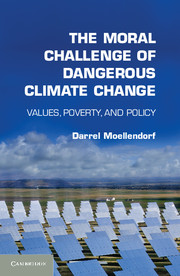Book contents
- Frontmatter
- Dedication
- Contents
- Acknowledgments
- Introduction
- 1 Danger, Poverty, and Human Dignity
- 2 The Value of Biodiversity
- 3 Risks, Uncertainties, and Precaution
- 4 Discounting the Future and the Morality in Climate Change Economics
- 5 The Right to Sustainable Development
- 6 Responsibility and Climate Change Policy
- 7 Urgency and Policy
- Afterword Frankenstorms
- Appendix A The Antipoverty Principle and the Non-Identity Problem
- Appendix B Climate Change and the Human Rights of Future Persons: Assessing Four Philosophical Challenges
- Appendix C The Right to Sustainable Development versus International Paretianism
- Appendix D Declaration on Climate Justice
- Bibliography
- Index
- References
Introduction
Published online by Cambridge University Press: 05 June 2014
- Frontmatter
- Dedication
- Contents
- Acknowledgments
- Introduction
- 1 Danger, Poverty, and Human Dignity
- 2 The Value of Biodiversity
- 3 Risks, Uncertainties, and Precaution
- 4 Discounting the Future and the Morality in Climate Change Economics
- 5 The Right to Sustainable Development
- 6 Responsibility and Climate Change Policy
- 7 Urgency and Policy
- Afterword Frankenstorms
- Appendix A The Antipoverty Principle and the Non-Identity Problem
- Appendix B Climate Change and the Human Rights of Future Persons: Assessing Four Philosophical Challenges
- Appendix C The Right to Sustainable Development versus International Paretianism
- Appendix D Declaration on Climate Justice
- Bibliography
- Index
- References
Summary
Our world is beset with several pressing problems, including war, intolerance, poverty, and climate change. The theme of this book takes up the last two items on this bleak list. It should be scandalous that nearly half the world's population lives in desperate poverty, especially while many lavish in such plenty. And the fact that despite the formation of the 1992 United Nations Framework Convention on Climate Change (hereafter “UNFCCC” for the institution and “the Convention” for the treaty), globally we continue to emit more CO2 each year, even as we become more aware of the harmful effects of doing so, is evidence of an enormous collective failure. This book takes the problem of global poverty to be central to climate change policy. In so doing, it rejects the approach of many attempts that address the problem of climate change in isolation. Some even make a virtue out of doing so. I take that to be a grave moral mistake.
Some analysts of climate change policy contend that an international climate change agreement should be oriented only around the values of efficacy and efficiency. Claims of equity, fairness, and poverty eradication are sometimes rejected as redistributive and as poison to the process of reaching a climate change agreement, because redistribution would render an agreement counter to the interests of highly developed states. Two considerations tell against this view. First, from the beginning of the international discussions on climate change it has been clear that climate change mitigation was one important aim, but not the only one. That aim has always been accompanied by a concern that poverty-eradicating human development be continued – that a climate change regime not establish hurdles to this developmental aim. International climate negotiations are not simply about climate change; they are also about a fair framework for energy consumption, which is necessary for states seeking to eradicate poverty within their borders. This point is too often missed, and not only by writers who cannot see beyond the value of efficiency. Even writers who take the negotiations to be concerned with multiple problems can be blind to the importance that regulating access to energy for poverty-eradication purposes plays in the negotiations.
- Type
- Chapter
- Information
- The Moral Challenge of Dangerous Climate ChangeValues, Poverty, and Policy, pp. 1 - 8Publisher: Cambridge University PressPrint publication year: 2014



